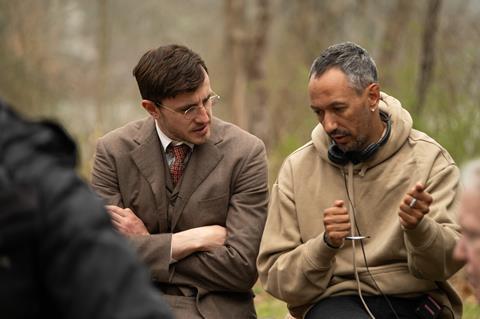South African director Oliver Hermanus tells Screen how he kept Josh O’Connor and Paul Mescal attached to The History Of Sound through thick and thin.

”Paul Mescal and Josh O’Connor in 2020 were totally different propositions to the market than they are now,” says Oliver Hermanus, who directs the duo in his gay period drama The History Of Sound, which is premiering in Competition on May 21.
When they were first cast, Mescal had only Normal People under his belt, while O’Connor was still considered an indie darling (though an Emmy-winning turn for The Crown was around the corner). Three years later, when The History Of Sound was finally ready to shoot, it was a very different story. So, how did the South African, US-based filmmaker keep the two movie stars on board?
“We had a WhatsApp group,” shrugs Hermanus. “We had become good friends, and they were both just so determined to make this film with me.”
The fact the actors shared a US agent did not hurt either, adds Hermanus, whose previous feature directing credits include Moffie (2019) and Living (2022).
Adapted from Ben Shattuck’s short story, The History Of Sound follows Kentuckian farmer-turned-opera singer Lionel (Mescal) whose song-collecting trip with the charismatic David (O’Connor) leaves a lasting impression. “It’s my attempt at a reflexive love story,” says Hermanus, who was inspired by the likes of The English Patient and Days Of Heaven.
The director produces the feature with US outfit End Cue, Fat City’s Sara Murphy, Thérèsa Ryan-van Graan and Closer Media’s Zhang Xin. Film4, Closer Media, Tango Entertainment and Storm City Films are among the financiers. Mubi and Focus Features/Universal have North American and international distribution, respectively.
How did you bring the project together?
I read the short story on an airplane and knew instantly I wanted to be a part of it. I met with the production company [End Cue] that was considering optioning it, and Ben [Shattuck], and formalised my participation.
Covid literally happened a month or two after I was attached. I was still living in South Africa, in the middle of nowhere on a little farm, so was sort of guiding Ben through the development process. He wrote the screenplay very quickly, in a couple of months. It was hard to convince people to put up money because it’s expensive. It’s a period piece and we travel around the world.
It’s a very subtle form — it’s a portrait of a life, but through a very quiet process. And these days, making quiet films is incredibly hard.
The project was delayed for several years, in part because of financing. Did Paul and Josh’s rising profiles help secure that final push?
Definitely. When Living got two Academy Award nominations, Paul was also nominated for Aftersun so we were doing that whole Oscar thing together. It was very helpful for him and I just to be in the same room a lot, because we could jointly talk to people about [the film].
When the casting was first announced, the topic of whether straight actors should play gay characters inevitably arose. Was this ever a concern in your casting?
It was never a thing in my mind. I’ve done many movies and a TV show [Mary & George] that dealt with various kinds of sexualities, and I never thought to cast in that way. I would never say to a woman, “You’re not a mother so how can you play a mother?” I feel quite confident in my casting. I totally believe in the actor or the actress for the job.
The History Of Sound takes place in the US, UK and Italy. Were you able to film in all three countries?
Yes, it was important to me to be able to film in the actual locations — especially the Lake District [in the UK] and Italy — because I think it gives the film the breadth that it needs. It was hard because being able to make the film that way is a big financial question. The very first iteration of this movie required me to cut out those bits, or try to shoot them in one country, like the US. That was a moment when I had to put my foot down.
Your next project is an untitled biopic of the late UK fashion designer Alexander McQueen. Where are you at with that?
It’s very much moving. It’s actually quite a serendipitous project because I have been attached for a long time but it predates me, so I’ve sort of started from scratch with it. Me and [writer Harry Lighton, also in Cannes with Un Certain Regard debut Pillion] are very busy trying to get it together.
























No comments yet